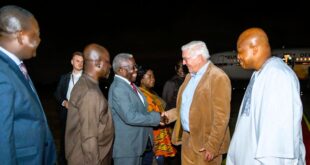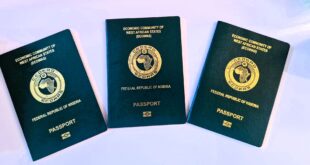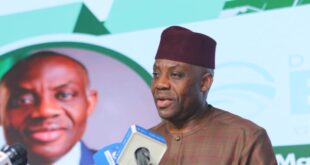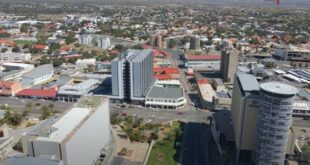International criticism of the alleged military takeover of power in the West African country of Guinea is growing louder. After UN Secretary General António Guterres condemned the coup, the European Union, the African Union, ECOWAS, France and Britain have also publicly expressed their criticism. The exact background and circumstances of the turbulent events of Sunday in the country’s capital city Conakry were still not clear on Monday night.
According to the British Embassy in Conakry, there was sustained gunfire in several locations in the capital over the course of Sunday. Videos circulated on social media, initially unverifiable, suggesting that President Alpha Condé had been overthrown.
A video with the logo of the state broadcaster showed several men in military uniform and carrying the national flag – one of them claimed that the government had been deposed. He also said that the constitution had been suspended and that the country’s borders were closed. In another video, Condé himself was seen with men in military uniform, suggesting that he was under arrest. The whereabouts of the 83-year-old president were initially unclear.
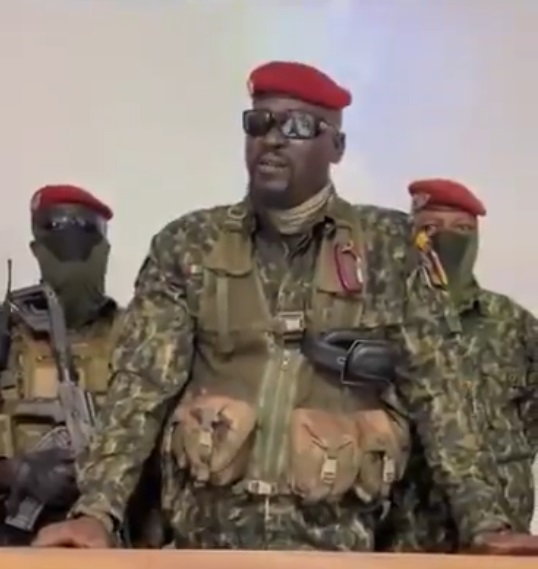
UN chief Guterres has called for the immediate release of President Condé on Twitter on Sunday evening. British Ambassador David McIlroy and the EU’s foreign affairs representative, Josep Borrell, have also expressed similar sentiments. Borrell appealed to all to act according to the rule of law for the sake of peace and for the good of the Guinean people. Guinea’s former colonial master France has also condemned the attempt to seize power by force and demanded a return to constitutional order and Condé’s immediate and unconditional release.
According to media reports, the coup is led by Lieutenant Colonel Mamady Doumbouya, the commander of Guinea’s Special Forces.
Doumbouya read a statement on national TV announcing the coup in which he justified Condé’s ouster.
“The socio-economic situation of the country, the dysfunction of republic institutions, the instrumentalization of justice, the trampling of the rights of citizens, the financial mismanagement[..] has led the republican army to resume its responsibility towards the sovereign of Guinea as a whole,” Doumbouya stated in a video.
“After having arrested the president, who is right now with us, we have decided to dissolve the current Constitution, dissolve the institution and the government, and the closure of land and air borders,” he added.
Doumbouya is a former French Legionnaire, a branch of the French army that recruits foreigners. He received military training in France, Israel, Senegal and Liberia and has participated in different missions in Afghanistan, Ivory Coast, Djibouti and the Central African Republic.
In 2018, he was called to Guinea by President Alpha Conde to take charge of the newly formed Guinea’s Special Force.
The French Legionnaires is known for recruiting foreign soldiers including those of African origins, especially citizens of former French colonies. They’ve been operating in Africa since the colonial days and still have a strong presence on the continent. Many Africans accused the legionnaire for numerous post-colonial coups that took place on the continent in the past decades.
Videos circulating on social media show Conakry residents cheering and applauding the patrolling soldiers.
President Condé came to power in 2010 in the first free democratic election since Guinea’s independence in 1958. He is credited with reforms in the economy and the military, as well as bringing more stability after decades of political turbulence. Critics, however, see Condé as an increasingly authoritarian ruler whose tenure was marked by human rights abuses. Last year, he secured a third term in office after a controversial constitutional amendment. The vote was preceded by months of political tensions and violent protests which led to many deaths of protesters.
Adira Kallo with agency report
 THE AFRICAN COURIER. Reporting Africa and its Diaspora! The African Courier is an international magazine published in Germany to report on Africa and the Diaspora African experience. The first issue of the bimonthly magazine appeared on the newsstands on 15 February 1998. The African Courier is a communication forum for European-African political, economic and cultural exchanges, and a voice for Africa in Europe.
THE AFRICAN COURIER. Reporting Africa and its Diaspora! The African Courier is an international magazine published in Germany to report on Africa and the Diaspora African experience. The first issue of the bimonthly magazine appeared on the newsstands on 15 February 1998. The African Courier is a communication forum for European-African political, economic and cultural exchanges, and a voice for Africa in Europe.







